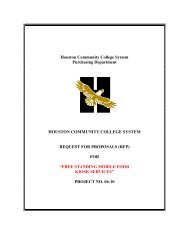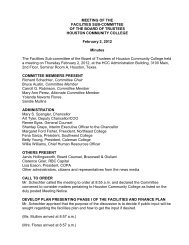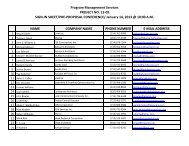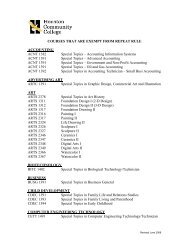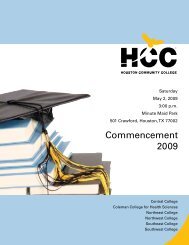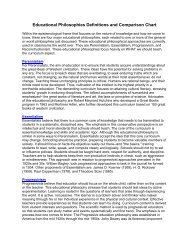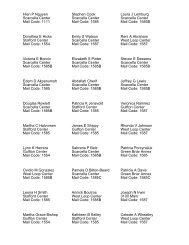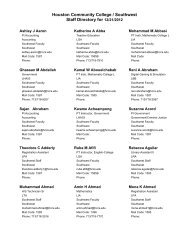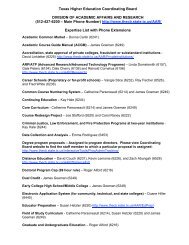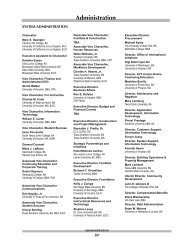General Course Descriptions - Houston Community College System
General Course Descriptions - Houston Community College System
General Course Descriptions - Houston Community College System
You also want an ePaper? Increase the reach of your titles
YUMPU automatically turns print PDFs into web optimized ePapers that Google loves.
interpreting and solving calculation problems<br />
encountered in the preparation and distribution<br />
of drugs . Conversion of measurements within the<br />
apothecary, avoirdupois, and metric systems with<br />
emphasis on the metric system of weight and volume .<br />
Topics include ratio and proportion, percentage, dilution<br />
and concentration, milliequivalent, units, intravenous<br />
flow rates, and solving dosage problems .<br />
pHrA 1313 CoMMunity<br />
pHArMACy prACtiCe<br />
prerequisite: Admission into the pharmacy<br />
technician program<br />
Credit: 3 (2 lecture, 2 lab)<br />
Introduction to the skills necessary to process, prepare,<br />
label, and maintain records of physicians’ medication<br />
orders and prescriptions in a community pharmacy .<br />
Designed to train individuals in supply, inventory, and<br />
data entry . Includes customer service, count and pour<br />
techniques, prescription calculations, drug selection<br />
and preparation, over-the-counter drugs, record<br />
keeping, stock level adjustment, data input, editing,<br />
and legal parameters .<br />
pHrA 1345 intrAVenous<br />
AdMixture And sterile<br />
CoMpounding<br />
prerequisite: Admission into the pharmacy<br />
technician program<br />
Credit: 3 (2 lecture, 4 lab)<br />
A study of sterile products, hand washing techniques,<br />
pharmaceutical calculations, references, safety<br />
techniques, aseptic techniques in parenteral<br />
compounding, proper use of equipment, preparation<br />
of sterile products, and safe handling of antineoplastic<br />
drugs .<br />
pHrA 1449 institutionAl<br />
pHArMACy prACtiCe<br />
prerequisite: Admission into the pharmacy<br />
technician program<br />
Credit: 4 (3 lecture, 3 lab)<br />
Exploration of the unique role and practice of<br />
pharmacy technicians in an institutional pharmacy<br />
with emphasis on daily pharmacy operation . Topics<br />
include hospital pharmacy organization, work flow and<br />
personnel, medical and pharmaceutical terminology,<br />
safety techniques, data entry, packaging and labeling<br />
operations, extemporaneous compounding, inpatient<br />
drug distribution systems, unit dose chart fills, quality<br />
assurance, drug storage, and inventory control .<br />
pHrA 1541 pHArMACy drug<br />
tHerApy And treAtMent<br />
prerequisite: Admission into the pharmacy<br />
technician program<br />
Credit: 5 (5 lecture)<br />
Study of therapeutic agents, their classifications,<br />
properties, actions, and effects on the human body<br />
and their role in the management of disease . Provides<br />
detailed information regarding drug dosages, side<br />
effects, interactions, toxicities, and incompatibilities .<br />
pHrA 2662 CliniCAl - pHArMACy<br />
teCHniCiAn/AssistAnt<br />
prerequisite: all pHrA courses<br />
Credit: 6 (25 lab)<br />
A health-related work-based learning experience that<br />
enables the student to apply specialized occupational<br />
theory, skills, and concepts . Direct supervision is<br />
provided by the clinical professional .<br />
pHtC 1311 FundAMentAls oF<br />
pHotogrApHy<br />
Credit: 3 (2 lecture, 4 lab)<br />
An introduction to camera operation and image<br />
production, composition, supplemental lighting, and<br />
use of exposure meters and filters .<br />
pHtC 1353 portrAiture i<br />
Credit: 3 (2 lecture, 4 lab)<br />
Photographic principles applied to portrait lighting,<br />
posing, and subject rapport .<br />
pHys 1305 pHysiCs For HeAltH<br />
sCienCes<br />
prerequisites: Must be placed into gust<br />
0341 (or higher) in reading and be placed<br />
into MAtH 0312 (or take MAtH 0308 as a<br />
co-requisite).Credit: 3 (2 lecture, 2 lab)<br />
Topics include physical mechanics applied to the<br />
skeletal frame, gravity and blood circulation, friction<br />
at body joints, hydrostatic change of blood pressure,<br />
heat transfer in humans, thermodynamics of biological<br />
systems, principles of electromagnetic radiation with<br />
respect to the inner body, and electrical hazards in<br />
patient care areas . Core Curriculum <strong>Course</strong> .<br />
pHys 1306 Current topiCs in<br />
pHysiCs<br />
prerequisites: Must be placed into gust<br />
0341 (or higher) in reading and be placed<br />
into MAtH 0312 (or take MAtH 0308 as a<br />
co-requisite).<br />
Credit: 3 (3 lecture)<br />
Non-science majors are introduced to solar power,<br />
nuclear fusion, atomic fission power plants,<br />
superconductivity, liquid helium relativity, elementary<br />
particles and symmetry, electromagnetic radiation,<br />
stages of matter, the basic forces in nature, and<br />
the dual nature of light . Core Curriculum <strong>Course</strong> .<br />
pHys 1401 <strong>College</strong> pHysiCs i<br />
prerequisites: MAtH 1314, 1316; Must also<br />
be placed into gust 0341 (or higher) in<br />
reading.<br />
Credit: 4 (3 lecture, 3 lab)<br />
Non-calculus based course for medical related<br />
majors, architecture majors, technology majors,<br />
and other non-engineering and non-science majors .<br />
Topics include motion and forces, work and energy,<br />
momentum and collision, and the thermal properties<br />
of matter . Laboratory exercises include selected<br />
related experiments on these topics . Core Curriculum<br />
<strong>Course</strong> .<br />
<strong>Course</strong> desCriptions<br />
287<br />
pHys 1402 <strong>College</strong> pHysiCs ii<br />
prerequisite: pHys 1401; Must also be<br />
placed into gust 0341 (or higher) in<br />
reading.<br />
Credit: 4 (3 lecture, 3 lab)<br />
Continuation of non-Calculus based physics<br />
for medical related majors, architecture majors,<br />
technology majors and other non-engineering and<br />
non-science majors . Topics include wave motion,<br />
electricity, magnetism, electromagnetic waves,<br />
optics, and topics in modern physics . Laboratory<br />
exercises include selected related experiments on<br />
these topics . Core Curriculum <strong>Course</strong> .<br />
pHys 2125 pHysiCs lABorAtor<br />
prerequisite: Must placed into Math 2414<br />
(or higher).Must also be placed into gust<br />
0341 (or higher) in reading.<br />
Credit: 1 (3 lab)<br />
Selected laboratory experiments related to topics in<br />
PHYS 2325 (University Physics I) for science and<br />
engineering majors . Core Curriculum <strong>Course</strong> .<br />
pHys 2126 pHysiCs lABorAtory ii<br />
prerequisite/Corequisite: pHys 2326; Must<br />
be placed into gust 0341 (or higher) in<br />
reading and be placed into MAtH 2414 (or<br />
higher).Credit: 1 (3 lab)<br />
Selected laboratory experiments related to topics in<br />
PHYS 2326 (University Physics II) for science and<br />
engineering majors . Core Curriculum <strong>Course</strong> .<br />
pHys 2325 uniVersity<br />
pHysiCs i<br />
prerequisites: Must placed into Math 2414<br />
(or higher). Must also be placed into<br />
gust 0341 (or higher) in reading.<br />
Credit: 3 (3 lecture, 1 lab)<br />
A calculus-based physics course designed specifically<br />
for chemistry, physics, and engineering majors .<br />
Topics include principles of mechanics, sound, wave<br />
phenomena, kinetic theory, fluid flow, and thermal<br />
physics . Core Curriculum <strong>Course</strong> . (formerly PHYS<br />
2425)<br />
pHys 2326 uniVersity<br />
pHysiCs ii<br />
prerequisites: pHys 2425 or 2325 ; Must<br />
also be placed into gust 0341 (or higher)<br />
in reading and be placed into MAtH 2414<br />
(or higher).<br />
Credit: 3 (3 lecture, 1 lab)<br />
Continuation of calculus based physics . <strong>Course</strong><br />
designed specifically for chemistry, physics, and<br />
engineering majors . Includes principles of electricity<br />
and magnetism, optics, electromagnetic waves,<br />
relativity, kinetic theory, introduction to quantum<br />
theory, thermal physics, and other physics topics . Core<br />
Curriculum <strong>Course</strong> . (formerly PHYS 2426)<br />
plAB 1223 pHleBotoMy<br />
Credit: 2 (1 lecture, 4 lab)<br />
Skill development in the performance of a variety of<br />
blood collection methods using proper techniques and<br />
universal precautions . Includes vacuum collection<br />
devices, syringes, capillary skin puncture, butterfly<br />
needles and blood culture, and specimen collection<br />
on adults, children, and infants . Emphasis on infection<br />
prevention, proper patient identification, labeling<br />
of specimens and quality assurance, specimen<br />
handling, processing, and accessioning . Topics include<br />
professionalism, ethics, and medical terminology .



